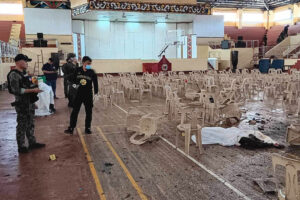
Philippine manhunt afoot for bombing suspects
By Kyle Aristophere T. Atienza, Reporter
A MANHUNT is under way for the attackers who bombed a Catholic Mass that killed four people in southern Philippines, a senior military officer said on Monday, vowing to do everything possible to bring the perpetrators to justice.
Police are looking into at least two suspects they think were behind the blast, which Islamic State (IS) militants claimed.
“As we speak, there’s an ongoing massive operation to hunt these terrorist groups or suspected perpetrators of the bombing,” William Gonzales, Western Mindanao Command chief, told reporters after a security meeting in Marawi City.
The bomb went off on Sunday during a service at a university gymnasium in Marawi, a city left in ruins in 2017 by a five-month military campaign to end an occupation by Islamic State loyalists that had triggered alarm across Asia.
“(We have persons) of interest, but the investigation is still ongoing,” regional police chief Allan Nobleza told GMA News, adding that one of the suspects was linked to a local militant group. “In order not to preempt the investigation, we will not divulge the names.”
The United States condemned the “horrific terrorist attack” and said it stood with Filipinos in rejecting violence, joining a chorus of support from countries including Japan, Australia, Britain, China and Canada. “We mourn those killed in the attack, and our thoughts are with the injured,” State Department spokesman Matthew Miller said in statement.
Islamic State militants claimed responsibility for the bombing at Mindanao State University, shortly after Philippine President Ferdinand R. Marcos, Jr. said “foreign terrorists” were responsible.
Marawi is in an area known as Bangsamoro, an underdeveloped Muslim region in the predominantly Catholic Philippines, that has for decades battled with lawlessness, separatist violence and clan conflicts, prompting concern that it could become fertile ground for extremism.
Military chief Romeo S. Brawner, Jr., who attended a security briefing with troops and police in Marawi, said he suspected the bombing could be a retaliatory attack for operations against local extremist groups in the southern region of Mindanao.
“That could be one of the strong possibilities why this occurred,” Mr. Brawner said. “Your security forces… are working doubly hard to make sure that the perpetrators of this terrorist attack will be brought to justice.”
The military recently said it had killed a senior operative from Abu Sayyaf, a group notorious for kidnapping and piracy that has aligned itself with the Islamic State.
‘INTERNATIONAL IMPLICATIONS’
Abu Sayyaf’s late leader, Isnilon Hapilon, was Islamic State’s anointed “emir” in Southeast Asia and mastermind of the 2017 occupation of Marawi, which led to the deaths of more than 1,000 people during a five-month war, among them fighters from multiple countries. Mr. Hapilon was killed by a sniper.
The military said it had also conducted two operations in Mindanao on Friday and Sunday against Dawlah Islamiya-Maute, a group that joined Hapilon in taking over Marawi in 2017, seeking to turn it into a Southeast Asian wilayat — or governorate — for Islamic State.
Spokesman Xerxes Trinidad said the military was trying to validate Islamic State’s claim of responsibility.
Of the 54 who were wounded in the bombing, Mr. Trinidad said only seven remained in hospital.
Classes resumed in Marawi on Monday, but with tighter security.
The bombing incident prompted authorities to put Metro Manila under a heightened alert.
Terror groups are hard to disperse since they work underground, Joshua Bernard B. Espeña, who teaches international relations at the Polytechnic University of the Philippines, said in a Facebook Messenger chat.
“In the case of IS, it was never eradicated to begin with,” he said. “The group can be safely termed a blob network, with various groups pledging allegiance to IS’ anthem; one group would just be subsumed into another based on religious, financial and political grounds.”
Antonio A. Contreras, who used to teach political science at De La Salle University in Manila, said the Sunday attack should not stop the government from focusing on external security since Islamic State threats have “international implications.”
“The IS, whatever you call them, is an external group,” he said by telephone. “It’s a false dichotomy to say that it’s going to now undermine or diminish the focus of the President on external threats. Terrorism that is financed by external forces is still an external threat.”
With IS claiming responsibility for the bombing, it’s easier to justify an external security-oriented action, said Hansley A. Juliano, who teaches political science at the Ateneo de Manila University, said in a Messenger chat.
“Local terrorist agents can do this only with supplies and training and intelligence from abroad,” he said. “Blocking those and finding out through international allies who are enabling them should help.”
Marawi City is the capital of Lanao del Sur, one of the five provinces in the Bangsamoro Autonomous Region in Muslim Mindanao, which was formed in 2019 as part of a peace deal to end a decades-long conflict between the government and Moro secessionists.
“The incident could again highlight the fragmentation of political groups in the island region, which would entail more attention and resources in addressing the causes of socioeconomic and ethnic divisions in the area,” Philip Arnold P. Tuaño, dean of the Ateneo School of School of Government, said via Messenger chat. — with Reuters



